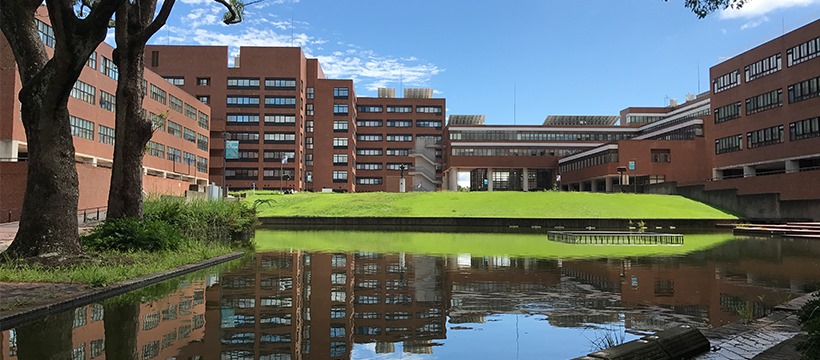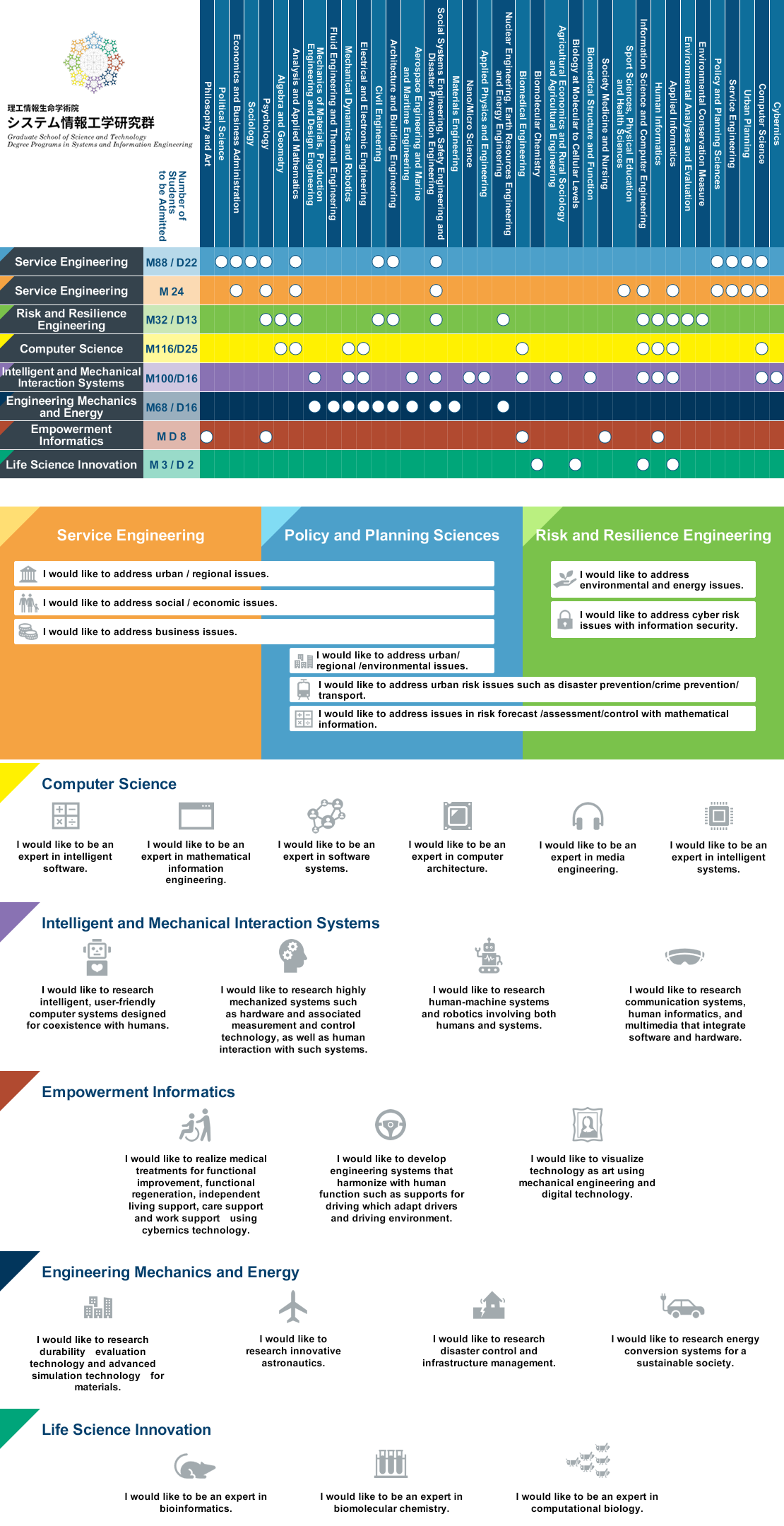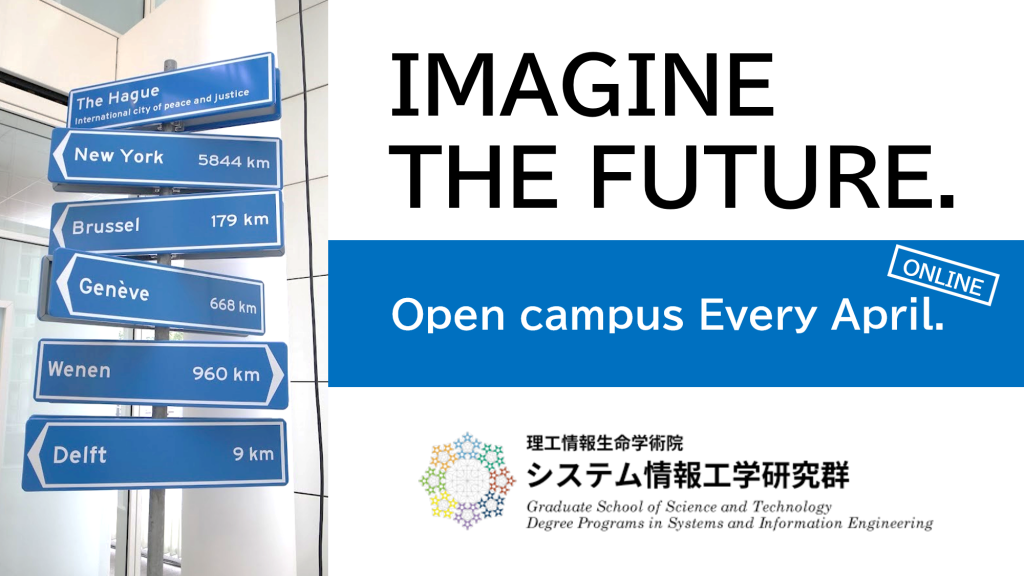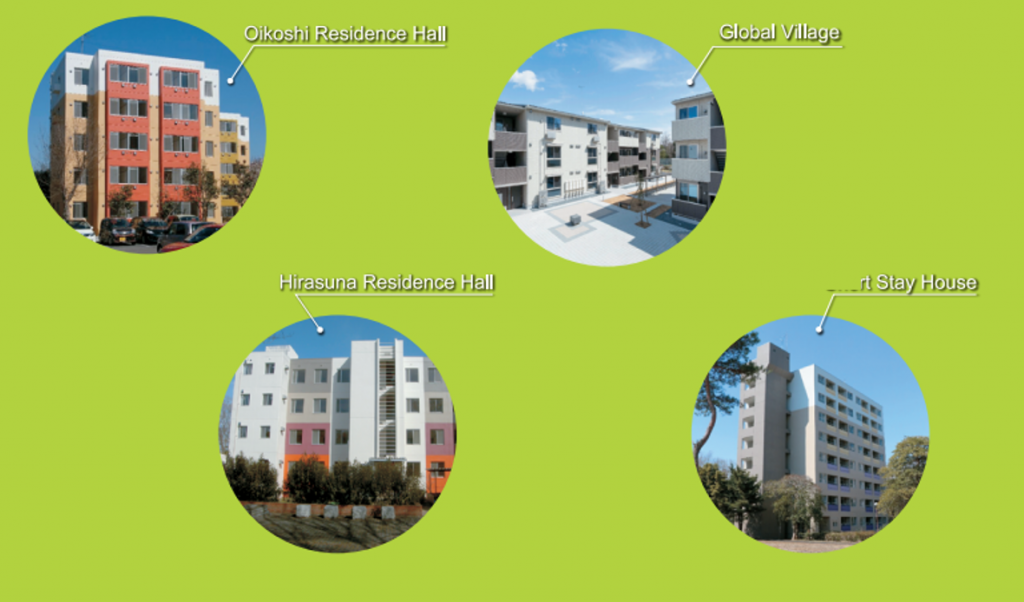- Overview
- Organization
Master's and Doctoral Degree Programs
Related Centers
Relevant Undergraduate Schools
- Faculty
- Education
- Research
- Job Opportunities
FAQ for International Students
(ver. March 31, 2022)
Are you interested in applying for Degree programs in Systems and Information Engineering (SIE)? By clicking on the tiles below, you can find all the information you need to start the application process.
General
A: Big, beautiful, and famous university in Japan!
The University of Tsukuba is one of the national universities established by Japanese Government in Tsukuba, Ibaraki (near Tokyo). The university has 28 college clusters and schools with around 16,500 students (as of 2014). The main Tsukuba campus covers an area of 258 hectares (636 acres), making it the second largest single campus in Japan. Meanwhile, the university is home to three Nobel laureates: former presidents of the institution Sin-Itiro Tomonaga and Leo Esaki won the physics prizes in 1965 and 1973 respectively, while professor emeritus Hideki Shirakawa won the chemistry prize in 2000.

You can visit Official Web and Instagram of our university. You can also see “Enrollment Guidebook for International Students” that provides comprehensive information for international students who wish to apply to our university!
A: Once you have made the decision to go to graduate school, the next step is to research programs that match your interests and fit your needs. Don’t limit yourself at this point, but instead gather information on a broad range of programs!
SIE has eight degree programs that are known for their distinctive style of education and research in a cutting-edge, multidisciplinary field that integrates systems, information, and society. See the following figures and select several programs that match your interests.

Each degree program has nice website with links to each lab. Once you select several programs, we recommend you to visit their website to find professors and lab information.
- Policy and Planning Sciences (PPS) [Web] [Profs]
- Service Engineering (SE) [Web] [Profs]
- Risk and Resilience Engineering (R2) [Web] [Profs]
- Computer Science (CS) [Web] [Profs]
- Intelligent and Mechanical Interaction Systems (IMIS) [Web] [Profs]
- Engineering Mechanics and Energy (EME) [Web] [Profs]
- Empowerment Informatics (EMP) [Web] [Profs]
- Life Science Innovation (Bioinfomatics) (LSI) [Web] [Profs]
You can also seek information of professors at Researchers Information at the University of Tsukuba [Web]
A: SIE is opening up its laboratories and campus to the public during Open Campus, every April . It is a once-a-year opportunity to see research activities of rising scientists who are tackling tomorrow’s problems today!

Admission Information
A: Application guidelines and admission information are available at the webpage [Web].
A: We offer entrance exam for overseas residents. Please read the application guidelines, available via the following page.
A: Please read the application guidelines, available via the following page.
A: If you have inquiries about admission, please check Admission FAQ first.
https://www.sie.tsukuba.ac.jp/visitor/exam/faq/eng
If you have further question, please E-mail the following address.
sysinfo.admission(at)un.tsukuba.ac.jp
※The @ in the e-mail address is written as (at). please rewrite it when you send the message.
Education and Research
A: We offer the following full English programs:
- Computer Science English Program [Master’s Program] [Web]
- Master’s/Doctoral Program in Life Science Innovation (Bioinformatics) [Web]
Besides the above-mentioned programs, you will basically be able to complete all the degree programs at SIE only with English, however, it may vary depending on programs/labs. Please contact and consult with your disired academic advisor.
Example of the courses instructed in English (For the students in the Degree Programs in Engineering Mechanics and Energy)
A: The Japanese Language Education Division of the Center for Education of Glocal Communication (CEGLOC) provides Japanese language courses for international students according to their student status and Japanese language proficiency. If you are interested in studying Japanese, please visit the website of the Japanese Language Education Division of CEGLOC.[Web].
Student Life (Tuition, scholarships, visas, places to live, etc.)
A: Examination fee, which is required when submitting university entrance applications, is JPY30,000. Admission fees, to be paid as part of entrance formalities, amount to JPY282,000. Tuition is JPY535,800 per year. For research students, entrance fees amount to JPY84,600, and monthly tuition is JPY29,700. Detailed information is available at the website [Web].
Graduate students who face financial difficulties and who demonstrate excellent academic records may be exempt from part or all of the tuition payments [Web]. The tuition exemption system, however, is not available for non-degree research students and credited auditors.
A: Information about scholarships (including Japanese Government scholarships) for privately-financed international students are available at the website [Web].
A: Graduate students who face financial difficulties and who demonstrate excellent academic records may be exempt from part or all of the tuition payments [Web]. The tuition exemption system, however, is not available for non-degree research students and credited auditors.
A: We have student residence halls to offer students excellent study environment along with the opportunity to experience autonomous civic life. For the other housing options, accommodation for short term student (Short Stay House), and shared accommodations (Global Village) are available. Furthermore, there are a number of apartments and condominiums near the campus [Web].










